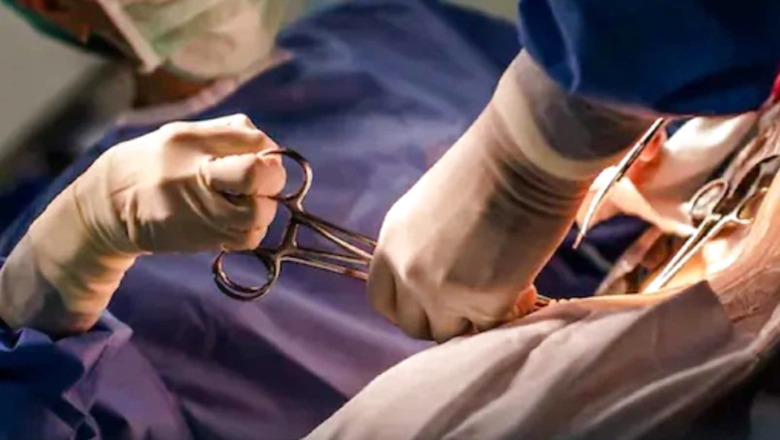
views
If you ever need a surgery and the doctor asks your caste before administering anesthesia, don’t get offended. It is only for a good cause. The caste link will help the doctor decide what anesthesia would be right for you otherwise you may end up on a ventilator longer than needed.
Before understanding the ‘Vaishya link’ to administering anesthesia, one should understand anesthesia and how it works. Anesthesia as a drug or a combination of drugs makes you feel painless or unconscious during a medical procedure.
The Various Chemicals
A human body comprises a neurotransmitter called acetylcholine. It is this chemical that signals the nerves particularly relating to muscles. For example, you touch a cup on the table unknowingly but realise its presence as soon as your skin touches it, it is the acetylcholine sending signals to the brain about the cup.
Succinylcholine or commonly known as general anesthesia is a skeletal muscle relaxant. It is used during emergency surgeries.
If a surgery is elective, the patient is advised to stay empty stomach for a few hours. An empty stomach means the risk of food material shifting into respiratory system while intubation (inserting the tube to help breathing) is ruled out. Intubation is mandatory after administering anesthesia since the muscles will be relaxed and lungs stop contracting. Hence, injecting Succinylcholine and intubation will happen within a minute. The patient will have to lose consciousness quickly for which Succinylcholine is the best choice as it starts its effect within 40 seconds of entering the body. Other anesthesia chemicals take 3 to 5 minutes to do the same job. This makes Succinylcholine the best choice for emergency surgeries and this has been used from over 80 to 90 years, explains Dr Muralidhar, Neuro Anesthesist, Apollo Speciality Hospital, Jayanagar, Bengaluru.
The Anti-Effect is Equally Important
Once Succinylcholine enters human body, an enzyme called Pseudo cholinesterase starts working against it. Pseudo Cholinesterase is an enzyme that is produced in the liver and is responsible for the metabolism of common anesthesia drugs of which Succinylcholine is one. Once Pseudo Cholinesterase completely metabolises Succinylcholine, the patient regains consciousness.
It is here the caste comes into picture. Vaishyas have a deficiency of Pseudo Cholinesterase or in many cases completely lack it. Which means returning to consciousness is a tough task for them. If the anesthetist isn’t aware of the patient as a Vaishyas and administers Succinylcholine, the said patient may continue to be in the state of unconsciousness leading to several other medical complications, explains Dr Anupama, Anesthetist, Radhakrishna Multi-Specialty Hospital, Bengaluru.
When anesthesia enters body, respiratory muscles along with several others slip into paralyze mode. Hence the ventilator support is a must for patients. The effect of the anesthetic drug should eventually subside and reverse after some time. But in Vaishyas because of the loss of Pseudo Cholinesterase this doesn’t happen and the effects of the drug doesn’t wean off. In turn, the patient will not breathe on their own and continue to be in that coma-like state.
Though quite rare, these situations, if not checked appropriately on time can continue for hours, days, months or even years. Prolonged ventilation may lead to an array of side effects like infections and complications in lungs and respiratory tissues setting in mechanical trauma.
The Various Studies
The Vaishya connection to Pseudo Cholinesterase deficiency is widely known by anesthetists all over. Over the years, various journals have been published with a deeper understanding of the subject. University OMF of Canada, Pseudo Cholinesterase deficiency in an Indian community – a study published in Journal of Pharma practice and Community Medicine clearly states the connection of the Vaishya community to the enzyme deficiency and its effects. Also, the Association of anesthetists have published a detailed study on this factor along with similar communities across the globe. This study was done by a team of experts from Royal London Hospital and Hammersmith Hospital, London in the year 1996.
The Solution
Blood transfusion from individuals who are non-Vaishyas will help, say experts. The deficit enzyme gradually enters the body metabolising Succinylcholine, which in turn help the patient wake. “This will certainly take a while, but is effective. Though I have not seen such a patient in my practice, I had come across a case during my post-graduation. The patient was treated with blood transfusion and various other drugs and she gained her consciousness within a day,” recalls Dr Anupama.
There are similar drugs like rocuronium, atracurium and others that are quick drugs used as muscle relaxants. Though they take a few seconds more than Succinylcholine, they are equally effective. So, to those patients whose background is not verified for enzymes, other anesthetic drugs are used as precautionary measure. Also, the risk is a bit high in inmates of orphanages, children born out of inter caste or inter religious marriages or people who simply do not take the surnames of the Vaishya clan out of choice even if they belong to one. The knowledge of one’s gene pool prove necessary in these cases.
Be Aware
The deficiency of Pseudo Cholinesterase is commonly found in Persian Jews, a few ethnic groups in Germany other than Vaishyas in India. Vaishyas in India are commonly identified as trading communities with surnames such as Chetty, Setty, Chettiyar, Gupta, Sreshty and so on. Some Vaishyas claim to be direct descendants of Aryan race which they connect with the gene glitch in Germans as well. Though it is still debated widely, the deficit of an enzyme associated with a certain group is surprisingly true. Also, marriages inside the community over the generations have only made sure that the deficiency has continued, agree experts.
Read all the Latest News, Breaking News and Assembly Elections Live Updates here.


















Comments
0 comment